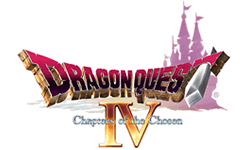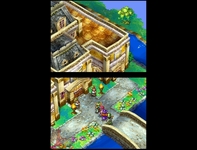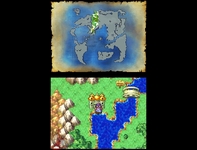|
|

|
PLATFORM
|
DS
|
BATTLE SYSTEM
|

|
INTERACTION
|

|
ORIGINALITY
|

|
STORY
|

|
MUSIC & SOUND
|

|
VISUALS
|

|
CHALLENGE
|
Moderate
|
COMPLETION TIME
|
20-40 Hours
|
|
OVERALL

|
+ Easy to play
+ Memorable music
+ Great NPC dialogue
+ Varied character backstories
- Battle system is a little too simple
- Somewhat archaic storyline
|
Click here for scoring definitions
|
|
|
Dragon Quest is a tough franchise for many North Americans to wrap their heads around. Contrary to the Final Fantasy series, each successive entry of Dragon Quest is guaranteed to have certain similarities rather than a breadth of new ideas. Some of the staples of Dragon Quest that its fans expect are Akira Toriyama's character designs and the traditional turn-based battle system. Dragon Quest still has progressed over the years from its first release on the Famicom in 1986 through each of its seven sequels, but certain aspects have remained in each game. This is not due to a lack of innovation or ideas, but rather a philosophy that focuses on tradition and a rabid Japanese fan base that demands it. The merits of this philosophy are shown in the well-designed Nintendo DS remake of Dragon Quest IV: Chapters of the Chosen, a game originally released in North America for the NES in 1992, and first remade in Japan for the PlayStation in 2001.
Dragon Quest IV's traditional systems make it a simple game to play. It can be picked up and played through without much thought toward the operation of the game. The randomly-entered battles are turn-based and give players four simple choices: attack, magic, item, or defend. These encounters occur as players roam the overworld map and search dungeons for special artifacts. This simplicity does not mean that the game can be blown through without any challenge, as the battles at times can be tough. The combat strategy involved in Dragon Quest IV usually comes down to party selection. Some characters are better at melee, some can heal, and some are best at magic attacks. There are a few options to automate party battle behavior -- stopping them from using magic or telling them to go all out -- if the player does not want to constantly reissue similar commands. There are no save spots in dungeons to give any relief from the random encounters, but the dungeons aren't long enough to really warrant them. Dungeons are simply designed and house plenty of treasures which can be found without excessive mapping and tedious exploration.
The simplicity of Dragon Quest IV's combat system is sadly part of its downfall, since tougher battles basically just take longer. Bosses generally use the same types of abilities; tougher ones usually only have a higher amount of hit points. At least random battles remain interesting due to the constantly varied combinations of enemies that are encountered. Sometimes a brand new enemy will appear even after fighting in an area for a while, including rare metal monsters which are evasive, yet reward massive amounts of experience. Enemies do have a decent selection of moves, such as calling for help, healing each other, or just outright fleeing. Even a simple random battle can become a longer affair when fighting six enemies who constantly replace each other by calling for help. A challenge on the edge of fairness in Dragon Quest IV can arise if the player travels the overworld map into an area filled with higher level enemies. At a certain point in the game this is very easy to do, and though it does allow players to take on greater battle challenges if desired, increasing experience, money, and item rewards, it can be frustrating to have the party annihilated by taking a few steps in the wrong direction. Luckily, the game guides players to their destinations fairly well, and even in death players simply have their gold halved without losing any experience or items.
The equipment system is -- surprise -- also simple. Upgrading to new equipment mostly requires saving up an exorbitant amount of money to purchase it. Grinding through battles is necessary to earn funds to equip new characters, and even with a large amount of grinding there may still be equipment that is just out of reach. This is a good thing for Dragon Quest IV because it gives purpose to the constant random battling. New equipment can also be found in dungeons and finding it is sometimes part of the main quest. Which of the party's characters can be equipped with what is also part of the battle strategy, as it may be better to bring a character who can heal and equip a certain sword rather than the character who can heal and attack with just a staff.
 Displaying the environment in both screens works really well
Displaying the environment in both screens works really well
|
|
Dragon Quest IV is aptly subtitled Chapters of the Chosen as the game's story is split into various chapters, each following the separate but eventually intertwining stories of the chosen ones destined to save the world. The chosen consist of a knight, a tomboy princess and her companions, two female dancers, a merchant, and the traditional player-named silent hero himself. The merchant, named Torneko, is a truly innovative character, giving the player a view of what it's like behind the counter at the weapon shop. The other chapters are nicely varied as well, and the story is what keeps Dragon Quest IV interesting through to the end. Though the story has the traditional save-the-world-from-the-evil-demon vibe and doesn't have many surprising plot twists, it is still well-paced and its simplicity makes it easy to follow. Most of the game follows a linear storyline, but the later chapters open up the entire world to free-roaming exploration. The player's direction is somewhat lost due to this, but journeying to unexplored areas to talk to NPCs and search for clues is not hard, and it is fun figuring out what to do or happening upon the discovery of a hidden artifact.
A neat design decision that makes the story more interesting -- though perhaps artificially -- is the use of dialogue accents. The NPCs from the various locales each speak with a different type of accent, from Russian to French to Scottish and onward, which further impose the fact that a new town is truly new and not just a copied, pasted, and rearranged area. These accents also serve to make communication with NPCs more fun than in the typical RPG, and give all of the NPCs a more unique personality.
Part of the game's charm comes from its sense of humor. While the overall story is somewhat dark, it still evokes a chuckle when reading the pun-filled names of the monsters or when catching a Peeping Tom NPC in the act. Akira Toriyama's art also lightens the mood, making even the most murderous creatures kind of cute. The graphics are clean and colorful, using a mix of both 2D and 3D. Monsters are creatively designed and have nicely animated battle sprites. The player's party is not shown during battle; melee attacks are represented by simple sword slashes or staff whacks, and spells by simple animations that don't break any new ground. Environments have a nice 3D look with simple doodads placed here and there.
The music in Dragon Quest IV is great, while the sound effects used are average. The traditional Dragon Quest songs in the game sound classically and professionally composed. Certain tunes are repeated often, but there are plenty of them and they all emphasize the feel of the area or part of the story you are in. Nostalgic beeps and boops accompany navigation through the menus, while the simple battle sounds are varied and basically just do their job.
 Torneko is a god
Torneko is a god
|
|
Dragon Quest IV's controls are similar to every other part of the game: simple. The menu system is easy to navigate; battles require pressing only a few buttons; selling, buying, and equipping items is a cinch; managing inventory is not a chore; and viewing the surroundings is elementary. At times, such as when in towns, the player is allowed to rotate the camera a full 360 degrees. At other times, such as when in most dungeons, rotation is restricted completely. This was a smart design choice, making dungeons easier to navigate rather than having to rotate constantly to find all the hidden secrets. The ability to see how much experience is required for each character's next level-up is still not available in the menu; this information is traditionally, and in this game, only available in town from a priest. This is one aspect of Dragon Quest that wouldn't be terribly missed if it were changed.
Originality in Dragon Quest IV comes primarily from its story. Torneko's chapter is probably the most original part of the game, with other characters' tales falling into typical conventions of the RPG genre: the tomboy princess who wants to be an adventurer, the silent protagonist, the knight on a journey, etc. However, the way that Dragon Quest IV tells these tales and brings them together keeps it from being boring. Do not expect anything original out of the battle system as it is straight out of the NES era. It is still a fairly solid battle system, though it would be nice if it were a little deeper.
Average players will complete Dragon Quest IV in around 40 hours, which fly by fast. Surprisingly, the game's unique style does allow it to hold up to current handheld RPGs, and as far as old-school remakes go it is one of the better ones out there. The early chapters keep the player interested with their differing storylines, while the later chapters offer fun, open-ended exploration of the world. A key problem with many random-encounter combat systems is that they are slow to get in and out of, but Dragon Quest IV's combat is quick and painless. The only real problems in Dragon Quest IV are the lack of depth in the battle system and its partially archaic storyline. The game's charm and ease of play alleviate both of these problems. Though being simple and traditional in nature, Dragon Quest IV is a great game to play on the go, and wonderful easy-on-the-brain fun. If you hate conventional RPGs, stay away from Dragon Quest as a series. If you love them, or want to try a good one, give Dragon Quest IV: Chapters of the Chosen a shot.
Review Archives
|









